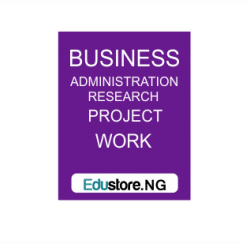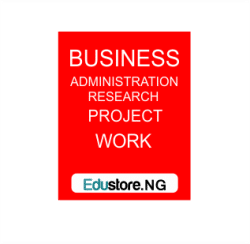Total Quality Management as a Tool for Enhancing Organization Development
Abstract
This study was on total quality management as a tool for enhancing organization development. Three objectives were raised which included: To examine and identify the key barriers and challenges that organizations encounter when attempting to implement TQM principles for organizational development, to assess the direct and indirect impacts of the identified challenges on the overall organizational development and to evaluate existing strategies and initiatives employed by organizations to overcome challenges in TQM implementation. A total of 77 responses were received and validated from the enrolled participants where all respondents were drawn from Adietz Foods, PH. Hypothesis was tested using Chi-Square statistical tool (SPSS).
Chapter one
Introduction
Background of the study
Total Quality Management (TQM) is a comprehensive management philosophy that emphasizes continuous improvement, customer satisfaction, and employee involvement to enhance organizational development. This approach focuses on achieving excellence in all aspects of an organization’s operations through the integration of quality principles and practices. TQM has been widely recognized as an effective tool for fostering organizational development, and numerous studies and scholarly articles support this assertion.
TQM encourages organizations to embrace a culture of continuous improvement. According to Deming’s Plan-Do-Check-Act (PDCA) cycle, organizations can identify areas for improvement, implement changes, monitor the results, and adjust as necessary. This iterative process contributes to organizational development by fostering adaptability and responsiveness to changing market conditions. (Yusuf, 2007)
TQM places a strong emphasis on understanding and meeting customer needs. By actively seeking and incorporating customer feedback into decision-making processes, organizations can tailor their products and services to better align with customer expectations. This customer-centric approach contributes to increased customer satisfaction, loyalty, and overall organizational success. (Talib et al., 2010)
One of the key principles of TQM is the involvement and empowerment of employees. Engaged and empowered employees are more likely to contribute innovative ideas and take ownership of their work, leading to increased productivity and job satisfaction. This participative approach to management fosters a positive organizational culture, contributing to overall organizational development. ((Gharakhani et al., 2013)
TQM emphasizes the importance of data and statistical analysis for decision-making. By collecting and analyzing relevant data, organizations can make informed decisions, identify trends, and measure progress toward organizational goals. This data-driven approach enhances the organization’s ability to adapt to changing circumstances and promotes evidence-based management. (Oakland, 2003)
TQM encourages collaboration with suppliers to ensure the quality of inputs into the production process. Building strong relationships with suppliers contributes to a more efficient and reliable supply chain, reducing the likelihood of defects and errors. This collaborative approach supports overall organizational development by fostering a network of trusted partners. (Bhatia (2003))
Total Quality Management serves as a powerful tool for enhancing organizational development by promoting continuous improvement, customer focus, employee involvement, data-driven decision making, and collaboration with suppliers. The principles and practices of TQM provide a solid foundation for organizations seeking to adapt and thrive in today’s dynamic business environment.
Statement of the problem
In the dynamic landscape of modern business, organizations are continually striving for excellence and sustainable development. One approach that has gained prominence in this pursuit is Total Quality Management (TQM), a comprehensive philosophy emphasizing continuous improvement, customer satisfaction, and employee involvement. While TQM is recognized for its potential to enhance organizational development, there remains a need to address specific challenges and gaps in its implementation.
Within the context of TQM, organizations encounter challenges in the effective implementation and integration of quality management principles into their daily operations. The problem statement revolves around understanding the impediments that hinder organizations from fully realizing the benefits of TQM. Key issues include inadequate employee engagement, resistance to change, insufficient commitment from leadership, and a lack of effective measurement mechanisms to gauge TQM effectiveness.
The effective implementation of TQM is critical for organizations aiming to achieve sustained growth, increased competitiveness, and heightened customer satisfaction. Failure to overcome the challenges associated with TQM adoption may result in suboptimal organizational performance, diminished product and service quality, and reduced overall customer trust. These consequences could hamper the long-term success and development of the organization in an increasingly competitive global market.
While there is a substantial body of literature endorsing TQM principles, there is a noticeable gap in understanding the specific challenges organizations face in implementing TQM for organizational development. Existing studies often focus on the theoretical aspects of TQM, overlooking the practical hurdles that organizations encounter during implementation. This research aims to bridge this gap by delving into the nuanced challenges faced by organizations in adopting and fully benefiting from TQM practices.
Objective of the study
- To examine and identify the key barriers and challenges that organizations encounter when attempting to implement TQM principles for organizational development.
- To assess the direct and indirect impacts of the identified challenges on the overall organizational development.
- To evaluate existing strategies and initiatives employed by organizations to overcome challenges in TQM implementation
Research Hypotheses
H1: There are no key barriers and challenges that organizations encounter when attempting to implement TQM principles for organizational development.
H2: There are no impacts of the identified challenges on the overall organizational development
Significance of the study
The significance of this study lies in its potential to contribute valuable insights to both academia and the business community, addressing critical issues related to the implementation of Total Quality Management (TQM) as a tool for enhancing organizational development. The study is significant for the following reasons:
The findings of this study will offer practical guidance to organizations seeking to implement TQM strategies for organizational development. By identifying and addressing specific challenges, practitioners will gain actionable recommendations to enhance the effectiveness of their quality management initiatives.
Understanding the barriers to TQM implementation is crucial for organizations aiming to improve their overall performance. By addressing these challenges, organizations can optimize their processes, enhance product and service quality, and ultimately contribute to their long-term development and success.
The study will contribute to the academic body of knowledge by filling a gap in the existing literature. By providing a nuanced understanding of the practical challenges associated with TQM implementation, the research will add depth to the scholarly discourse on quality management and organizational development.
TQM is fundamentally rooted in the philosophy of continuous improvement. This study will shed light on areas where organizations can continuously refine their TQM practices, fostering a culture of ongoing enhancement that goes beyond the scope of this specific research.
The insights gained from this study will empower organizational leaders to make informed decisions regarding TQM adoption. Leaders will be equipped with knowledge about potential obstacles and effective strategies, enabling them to guide their organizations toward successful implementation and sustained development.
Organizations that successfully overcome the challenges identified in this study will be better positioned to gain a competitive advantage. By leveraging TQM for organizational development, companies can enhance customer satisfaction, streamline processes, and differentiate themselves in the market.
The study’s recommendations and insights will contribute to the advancement of quality management practices. By understanding how organizations can effectively implement TQM, the study will aid in refining existing frameworks and methodologies for quality management.
Scope of the study
The scope of the study covers total quality management as a tool for enhancing organization development. The study will be limited to Adietz Foods, PH
Limitation of the study
While this study aims to provide valuable insights into the challenges associated with implementing Total Quality Management (TQM) for organizational development, it is essential to acknowledge certain limitations that may affect the scope and generalizability of the findings:
- Contextual Specificity: The research findings may be influenced by the specific context in which the study is conducted. Different industries, organizational sizes, and cultural settings may have unique challenges and nuances that limit the generalizability of the results to a broader population.
- Time Constraints: The study is conducted within a specific timeframe, and organizational dynamics can evolve over time. The time constraints may limit the researcher’s ability to capture long-term effects and changes in TQM implementation, potentially overlooking emerging trends or issues.
Definition of terms
- Total Quality Management (TQM): Total Quality Management is a management philosophy and approach that focuses on continuous improvement, customer satisfaction, and employee involvement. It encompasses a set of principles and practices aimed at achieving excellence in all aspects of an organization’s operations.
- Organizational Development: Organizational Development refers to the planned and systematic process of improving an organization’s effectiveness, efficiency, and overall well-being. It involves various interventions, strategies, and initiatives to enhance the organization’s capacity to adapt and thrive in a dynamic environment.
- Continuous Improvement: Continuous Improvement, often referred to as Kaizen, is the ongoing effort to enhance products, services, or processes incrementally. It involves the systematic identification and implementation of changes aimed at achieving higher levels of efficiency, quality, and customer satisfaction.
- Customer Satisfaction: Customer Satisfaction is a measure of how well a product or service meets or exceeds customer expectations. It reflects the customer’s perception of the value received and plays a crucial role in building loyalty and sustaining a positive reputation for the organization.
- Employee Involvement: Employee Involvement refers to the active participation, engagement, and contribution of employees in decision-making processes, problem-solving, and improvement initiatives within the organization. It is a key element of fostering a culture of teamwork and empowerment.
REFERENCES
- Sadikoglu, Esin. and Oclay,Hilal. (2014).The Effects of Total Quality Management Practices on Performance and the Reasons of and Barriers to TQM Practices in Turkey, Advances in Decision Sciences.Hindawi Pblishng Corporation. Doi: https://www.hindawi.com/journals/ads/2014/53760 5/
- Talib F., et al. (2012).Total Quality Management in Service Sector: A Literature Review. International Journal of Business Innovation and Research. 6 (3) 259- 301.
- Talib F., and Rahman Z., (2010).Critical Success Factors of TQM in Service Organizations: A Proposed Model. Services Marketing Quarterly. 31 (3) 363-380.
- Talib, F. (2013). An overview of total quality management: understanding the fundamentals in service organization, International Journal of Advanced Quality Management, Volume 1, Issue 1, pp. 1-20, Article ID Mgmt-58.
- Flynn, Barbar B, Roger G Schroeder, & Sadao Sakakibara (1994). A framework for quality management research and an associated measurement instrument, Journal of Operations Management.11 (4), pp::339-366
- For Reference Only: Materials are for research, citation, and idea generation purposes and not for submission as your original final year project work.
- Avoid Plagiarism: Do not copy or submit this content as your own project. Doing so may result in academic consequences.
- Use as a Framework: This complete project research material should guide the development of your own final year project work.
- Academic Access: This platform is designed to reduce the stress of visiting school libraries by providing easy access to research materials.
- Institutional Support: Tertiary institutions encourage the review of previous academic works such as journals and theses.
- Open Education: The site is maintained through paid subscriptions to continue offering open access educational resources.






